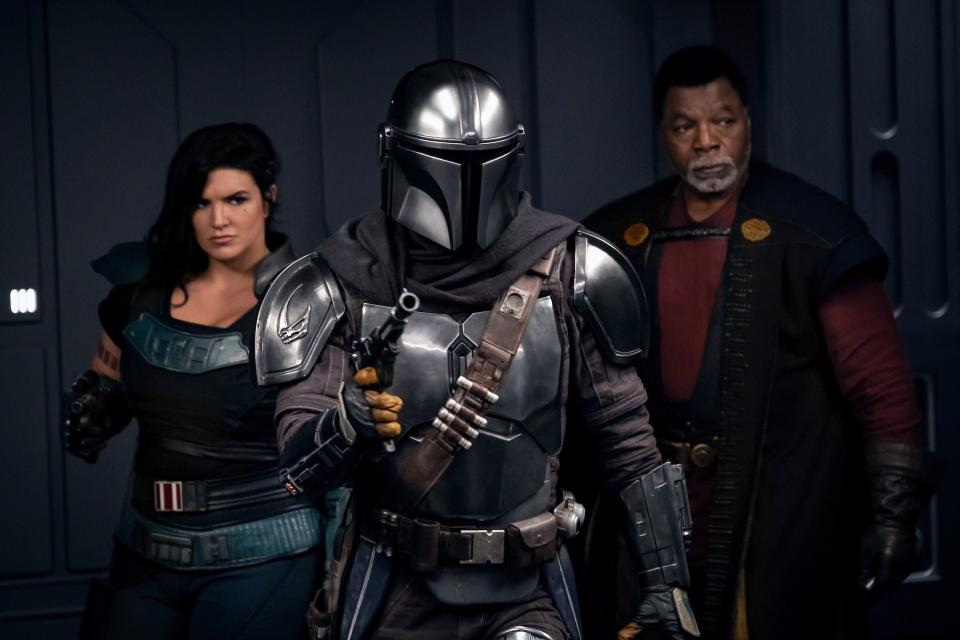The Mandalorian Is Star Wars That Haters Can Love
- Oops!Something went wrong.Please try again later.
The Mandalorian is now a massive mainstream hit, but it’s easy to forget that the series was not necessarily a sure thing. Yes, launching Disney+ with a TV show associated with one of the most successful movie series of all time is an obvious move, but Disney’s previous extensions of the Star Wars franchise were an absolute rollercoaster: A start full of promise ultimately concluded with a whimper that left plenty of road bumps along the way, including disappointing spinoffs. The Mandalorian, which returns this Friday for a second season, succeeds precisely because it leaves all that operatic source material behind.
The show is basically a space western: there’s a heist, a Magnificent Seven/Seven Samurai-inspired riff on protecting a defenseless town from enemy invaders, plenty of gunfights, and bounty hunting. Gone are the galactic wars, the Skywalker family tree, the good vs. evil battle between the Jedi and the Sith -- all the tiresome, endlessly picked-over, self-serious drama that Disney decided to rehash yet again in its movies. Instead, our nameless bounty hunter spends his time rubbing shoulders with the denizens of a grimy underworld while having utterly no idea who Luke, Leia, and Han are. Blissful relief! The Mandalorian’s eight-episode first season feels more in line with old Buck Rodgers and Flash Gordon serials, two touchpoints that inspired Lucas when creating the very first Star Wars back in ‘77.

The Mandalorian’s clever relationship to the original franchise is best exemplified by Baby Yoda, who became the kind of instant, organic, ubiquitous meme that giant entertainment conglomerates can only dream of. Baby Yoda is familiar enough to keep hardcore fans intrigued, and cute enough to pull in a new generation. He’s not just a propulsive plot device, he’s also a litmus test: If you love Baby Yoda, you’ll probably dig the rest of the series, which incorporates elements of a show like Lone Wolf and Cub into its space western vibe. Protecting Baby Yoda establishes smaller and more personable stakes. The Mandalorian isn’t about saving the day, a world, or even the galaxy; it’s about protecting a child. In a universe populated by strange aliens and complicated history, what’s more straightforward and human than the paternal instinct?
Divorcing itself from nine different Skywalker movies has made the show stronger, not weaker. So a handful of casting announcements for the second season signaling the inclusion of deep Star Wars lore are cause for some concern -- adding a beloved character like Ahsoka Tano is excellent fan service for those who’ve spent years reading Wookiepedia, sure, but could it mean some sort of complicated tie-in with previous plotlines? Fortunately, trailers for Season 2 suggest the focus will remain on the relationship between Baby Yoda and Mando. Even as the galaxy continues to broaden, The Mandalorian shouldn’t lose focus on what makes it work so well. Let’s not go back to the days when The Rise of Skywalker actively worked to undo new story arcs from the previous movies because its writers were unsure of taking a bold new stance.
For decades, the name Star Wars has signaled a very particular kind of story. The Mandalorian has shifted those notions and demonstrated just how willing audiences are to go along with something else — especially something that skips weighty continuity in favor of simple action and suspense narratives. The show has found a balance between the past and present — not unlike the way Anakin Skywalker brought balance to the Force.
Originally Appeared on GQ

